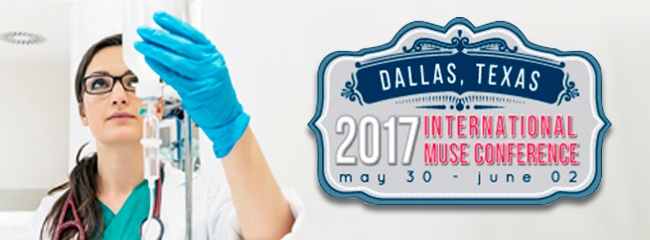Written by Alberta Guy, RN, BSN, Clinical Consultant, Professional Services

International MUSE is right around the corner, May 30 – June 2. MUSE provides excellent opportunities to network with peers and share information about what’s new in the MEDITECH community. This year, Smart Pump EHR Integration is new, and ed session #1117 offers nurse informaticists, pharmacists, IT analysts, and C-level hospital decision makers the chance to learn about this new and exciting technology. So mark your calendar and plan to attend “Connect Your Smart Pumps to MEDITECH,” which will be presented by Union Hospital and Iatric Systems on Thursday, June 1st at 9:00 a.m.
I began my nursing career in critical care more than 20 years ago, and I sure wish we had Smart Pump EHR Integration then! Whether you are a millennial or a baby boomer, if you’re a clinician you’ll relate to the story I’m about to tell. I hope those of you reading this who are in a position to influence your hospital’s decisions will elect to support integrating your smart pumps with your EHR. Not only to improve patient safety, but to ultimately save a nurse from the anguish of causing an error in the first place.
My personal story:
I walked on the unit at 6:30 AM, checked the assignment board, and next to my name it indicated I was being ‘pulled’ to the Coronary Care Unit.
I walked into the CCU and past bed 3. The lights were on, IV lines were hanging everywhere, and there was the recognizable sound of a ventilator. Our team received verbal report on all of the patients on the unit, and at the end of report, the charge nurse said, “give Alberta bed 3, it’ll be a good learning experience.” Thanks! I did a complete assessment, checked all my lines and machine settings, reviewed the medications to be given for the day, etc. Throughout the day, the patient’s condition deteriorated, and the physician handwrote an IV order for Nipride. The charge nurse reassured me she would help me get the medication ready as it would need to be wrapped in tin foil to protect it from light. I weighed the patient and calculated the dose/rate. The charge nurse checked my math, and I hung the medication (on a ‘dumb’ pump).
The next day I arrived on my unit, and my nurse manager wanted to speak to me in her office. She had an incident report in her hand. She informed me the calculation done to start the Nipride was incorrect. Not enough to harm the patient, but the news made me feel absolutely, positively ill. Even though I followed the policy to have complicated calculations double checked, it didn’t prevent an error. If we had a ‘Smart Pump’ that was integrated with the EHR, it certainly could have been averted.
At that time, hospitals didn’t have the remarkable technology of device integration that is available today. Let’s take a minute and imagine how this could have been so different if we did.
Today, most physicians enter orders using CPOE (vs. handwriting orders) to help eliminate transcription errors. Clinical documentation of the patient’s weight is stored in the EHR, making it available during the ordering process. This provides one of the key pieces of data necessary to determine the correct dose/rate for a medication, removing the need for a manual calculation and thus an error. Accelero Connect would have transmitted the medication order electronically to the smart pump, preventing me from making a manual pump programing error. Today, a nurse would use Bar Code Medication Administration (BCMA) to scan the patient, the medication, and the pump, perform the 5 rights of medication administration, verify the order on the smart pump, and press start to begin the infusion. Data from the smart pump would be passed to the EHR automatically for complete, accurate documentation, which can help increase revenue. All this would have saved me from the ‘learning experience’ of making an IV infusion error.
Ultimately, Smart Pump EHR Integration allows hospitals to be on the cutting edge of technology and integration while decreasing adverse events, improving staff productivity, and significantly increasing reimbursements. To err is human, but to have an integrated smart pump — that’s divine! Hope to see you at International MUSE.